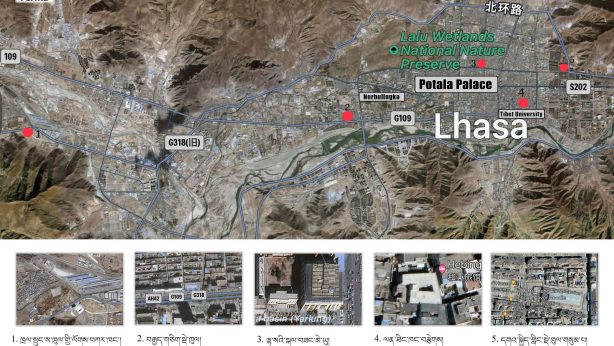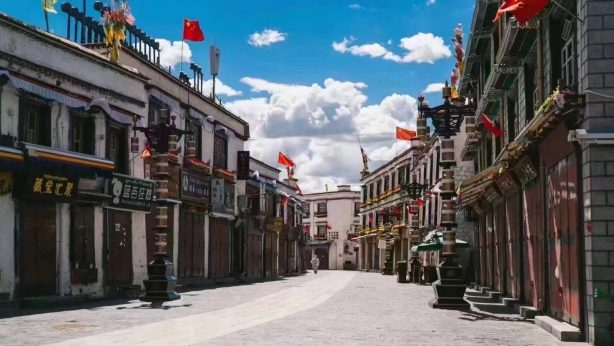Violations continue after China issues rare public apology for Covid failure in Tibet
As reported earlier by TCHRD, Chinese authorities have called for “striking hard” on those “spreading rumours about the pandemic” to further censor free speech to enforce zero-Covid policy in Lhasa and other major cities in Tibet Autonomous Region (TAR).
Conditions have continued to worsen since the spread of Covid-19 a month ago with unprecedented inflation driving some people to the brink of starvation. Hundreds of people have been detained in isolation centres, with or without infection, and served with stale food. Contrary to official media reports, the needs and appeals of the masses have gone unheeded. Left with no option, an unusual number of Tibetans are speaking out through writings, videos, and voice notes on social media, making desperate calls to the Chinese authorities to find a way out of the zero-Covid mess.
On 17 September, the vice mayor of Lhasa Municipality Mr Dradul bowed in front of the cameras as he apologised for the failure to meet the needs of the masses during the lockdown.
Addressing the official Chinese state media at the 11th press conference on the condition of the pandemic in Lhasa, he said in Chinese, “During a critical period when we had to control and prevent the epidemic, we were unprepared. We were ineffective, unable to combat [the crisis], and we mishandled the crisis. The testing procedures were inefficient. [We were] unprepared in setting up the quarantine centres, could not provide essential commodities on time, neglected cleanliness, unable to station health workers in high-risk areas. We sincerely accept criticism for these problems, which have had a greater impact on the productivity and life of some of the people. On behalf of the municipal government, I would like to express our deep apologies to the people of all ethnic groups and those stranded in Lhasa due to the epidemic.”
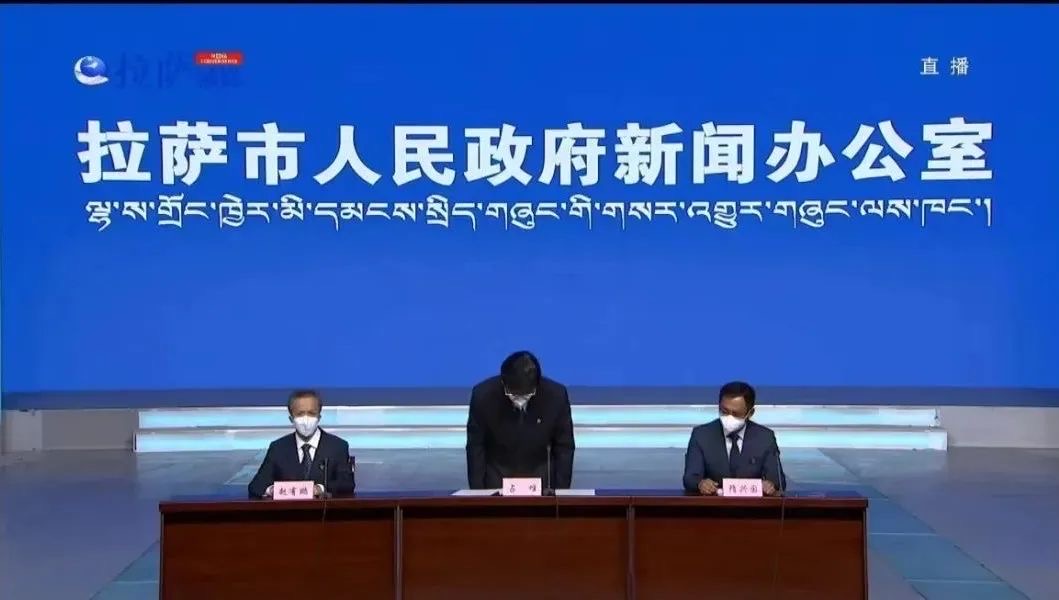
Tibetan netizens punished
On 18 September, a day after the public apology, the Lhasa Public Security Police issued the following announcement:
“Since the outbreak of the epidemic, the majority of Lhasa citizens have consciously abided by the relevant laws and regulations and epidemic prevention measures, actively cooperated with the epidemic prevention personnel, and jointly maintained the good social and public order and epidemic prevention and control work in our city. However, there are also people who ignore and violate relevant laws and regulations, fabricate and spread false information about the epidemic on the Internet, and cause negative social impact. Recently, three netizens from Xietongmen [Tib: Shetongmon] County in Xigaze [Tib: Shigatse] City, Chengguan District in Lhasa City, and Mozhugongka [Tib: Meldro Gongkar] County in Lhasa City, published rumours about the epidemic on Weibo and Douyin respectively. It confuses the public, incites oppositional emotions, creates troubles, endangers social and public safety, disrupts the order of epidemic prevention and control, and causes bad social impact. In accordance with the relevant provisions of the Law of the People’s Republic of China on Administrative Penalties for Public Security, the public security organs imposed administrative penalties on the abovementioned persons. The police remind that the cyberspace is not a place outside the law. The majority of netizens should strictly abide by the laws and regulations on network security management. For epidemic-related information, official and authoritative channels should be used as the standard. An orderly network environment and social order contribute to the fight against the epidemic with practical actions. For those who maliciously create, spread rumors, and incite illegal gatherings to cause trouble, the public security organs will investigate and punish them in accordance with the law!”
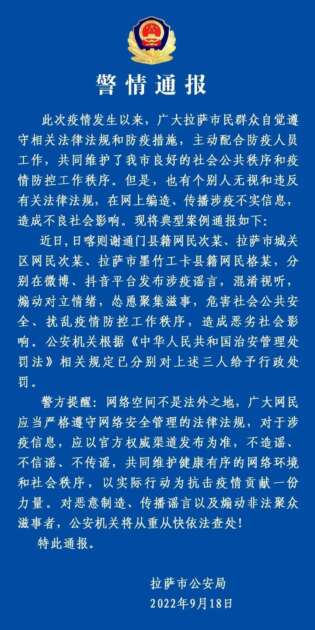
On 20 September, the Tibet Autonomous Region Cyber Security and Informatization Committee Office on their official page posted that seven people from Shigatse City had been prosecuted for allegedly spreading rumours about the pandemic.
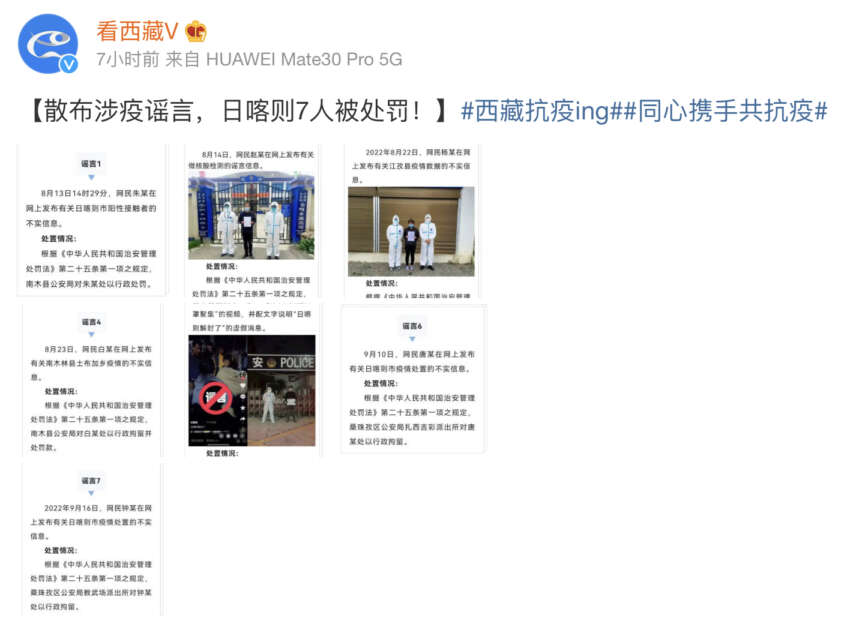
Again, on 20 September, the ‘Tibet Autonomous Region Online Illegal Information Reporting Centre’ posted on their page that the Lhasa City Public Security Police had handled 471 cases of people going out without permission and spreading rumours, while 786 people had been prosecuted.
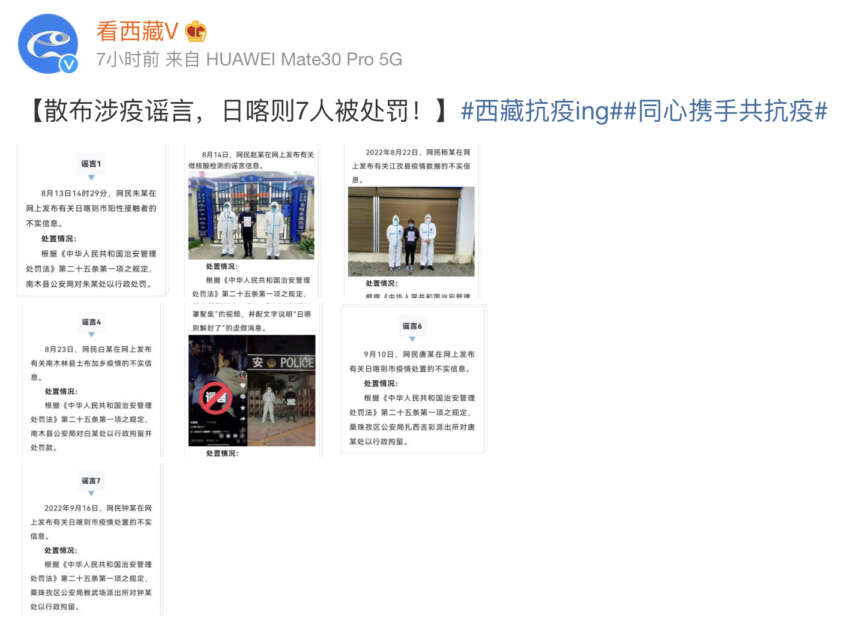
The aforementioned people were reportedly prosecuted under the Public Security Administration Punishment Law, particularly Article 25 which stipulates: “Anyone who commits any of the acts such as spreading rumors, falsely reporting dangers, epidemics, police information, or deliberately disrupting public order, shall be detained for not less than five days but not more than 10 days, and may also be fined not more than 500 yuan. If the circumstances are relatively minor, he/she shall be detained for not more than five days or a fine of less than 500 yuan.”
Furthermore, Paragraph 2 of Article 291-1 of the Chinese Criminal Law states that whoever “fabricates or deliberately spreads on media, including on the Internet, false information regarding dangerous situations, the spread of diseases, disasters and police information, and who seriously disturb social order” would be imprisoned for a maximum of seven years for those whose rumours result in “serious consequences.” Incidentally, this provision was added to the Criminal Law in a 2015 amendment that drew widespread criticism for failing to clarify the definition of “rumour’ thus contributing to further curtailment of freedom of speech of online users.
TCHRD urges the Chinese authorities to guarantee human rights of all Tibetans particularly those who provide much-needed information about the pandemic situation and the challenges and hardships faced by local people. We call for the immediate and unconditional release of people prosecuted for merely exercising their right to freedom of expression and other human rights. Chinese authorities should repeal or revise, wherever necessary, vague and overbroad legal provisions that are aimed at silencing dissent and criticisms against authoritarian lockdowns and other draconian measures to enforce zero-Covid policy in Tibet.

